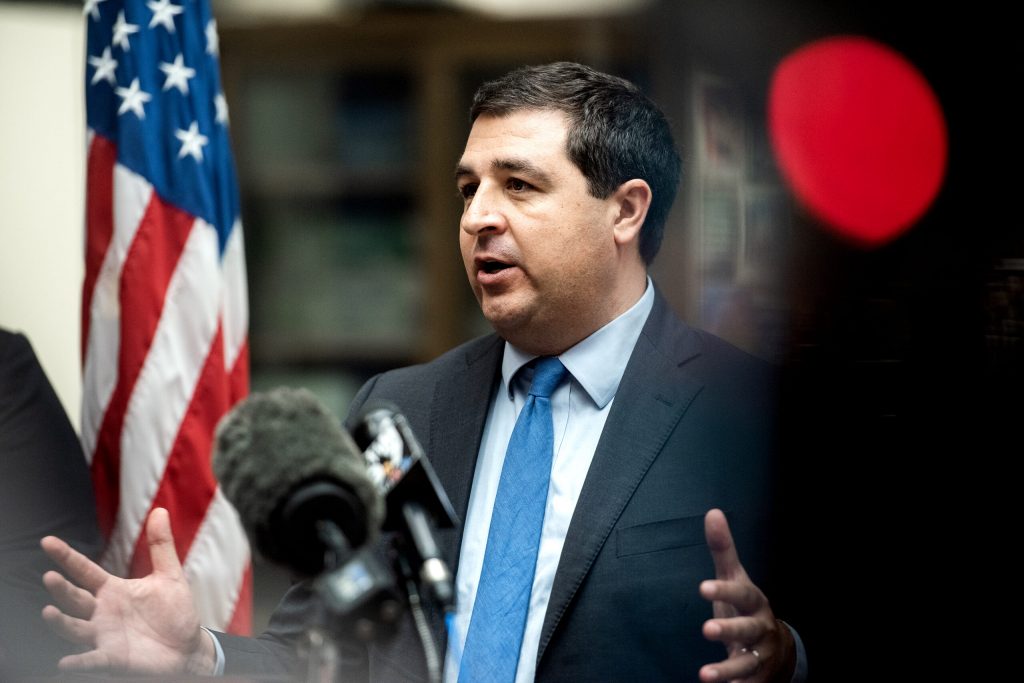Wisconsin Supreme Court Agrees With AG on Power to Settle Some Lawsuits
7-0 decision limits legislative power and lame-duck law passed by Republicans.

Attorney General Josh Kaul speaks Wednesday, March 1, 2023, at the Milwaukee Crime Lab in Milwaukee, Wis. Angela Major/WPR
In a unanimous decision, the Wisconsin Supreme Court has sided with Wisconsin’s attorney general in a dispute about the power to settle some lawsuits.
Specifically, justices concluded that the attorney general should have authority over resolving lawsuits if those lawsuits have to do with “core executive powers.”
Tuesday’s decision comes in response to a case brought by Wisconsin’s Democratic Attorney General Josh Kaul, and it reverses an early decision from a state appeals court. At issue was where the AG’s power ends and where the Legislature’s begins when it comes to resolving certain types of litigation.
Kaul, who was first elected as attorney general in 2018, challenged a 7-year-old Wisconsin law that gave the state Legislature’s Joint Committee on Finance the final say over approval of settlements in civil litigation prosecuted by the state’s attorney general.
The law was one of several passed by GOP lawmakers in late 2018 to limit the power of Wisconsin’s executive branch.
Legislators approved those changes in a lame-duck session shortly after Kaul and Tony Evers, both Democrats, won their November elections, replacing Republicans as attorney general and governor.
During oral arguments in April, Kaul’s office maintained that the lame-duck law violated the separation-of-powers principle that’s laid out in Wisconsin’s Constitution. The Department of Justice argued that the attorney general should have control over specific types of cases. That includes cases that have to do with executive authority, such as those enforcing environmental and consumer protection laws, the DOJ argued. The AG’s office also argued it applies to cases brought at the request of agencies for programs those agencies are tasked by law with administering.
Attorneys for Wisconsin’s Republican-controlled Legislature, however, argued that lawmakers have an “institutional interest” in overseeing settlements — especially when those settlements result in money paid to the state.
In a decision written by Justice Brian Hagedorn, justices concluded that while the Legislature can have power over the attorney general’s actions in some cases, that doesn’t apply to every situation.
Specifically, justices said that, under state laws, the attorney general has authority over civil enforcement actions as well as cases directed by state agencies.
“The settlement approval process allows a committee of the Legislature to control how the executive exercises its lawfully given statutory authority,” the decision states. “While that may be permissible in the realm of shared powers, it is impermissible in the realm of core powers. As the Legislature has failed to demonstrate that these types of cases implicate an institutional interest granting the Legislature a seat at the table, the powers at issue are core executive powers. Accordingly, there is no constitutional justification for requiring JFC sign-off on settlement agreements within these categories of cases.”
In a statement Tuesday, Kaul celebrated the decision, saying it will allow his office to “more efficiently” resolve cases, including those enforcing the state’s consumer and environmental protection laws. In the past, some settlement sign-offs in Wisconsin have been delayed while the AG’s office waited on the Legislature’s budget committee to take action.
“This unanimous ruling finally puts an end to the legislature’s unconstitutional involvement in the resolution of key categories of cases,” Kaul said.
The Wisconsin Supreme Court is expected to unleash a flurry of additional decisions in coming weeks, before the court’s current term concludes at the end of next month.
That includes a decision on whether or not a 19th-century state law criminalizes almost all abortions in the state.
Wisconsin Supreme Court unanimously sides with AG on power to settle some lawsuits was originally published by Wisconsin Public Radio.
If you think stories like this are important, become a member of Urban Milwaukee and help support real, independent journalism. Plus you get some cool added benefits.






















Hard to believe that it has taken so long to resolve this Walker-Vos-Fitzgerald lame-duck legislation. Rammed through in days and unspooled in seven years.
Tremendous move. Look forward to what’s next on the docket here ..